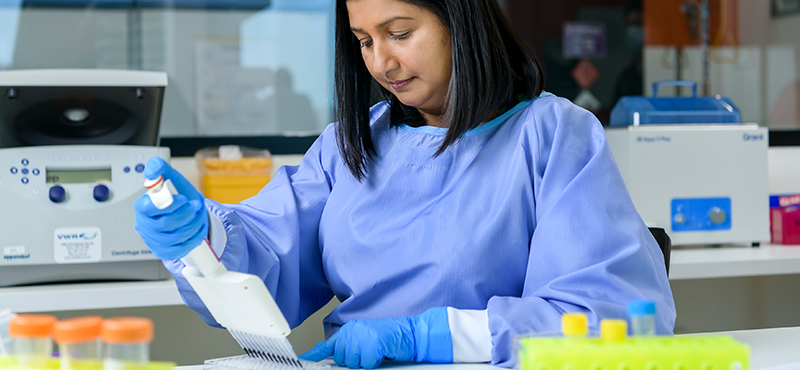The problem
For more than 200 years, vaccines have been central to the practical, population-scale management of a range of serious infectious disease challenges. However, despite safe and effective vaccines being available for a wide range of infectious diseases, prevention, and treatment of more complex conditions, including allergy and cancer, remain elusive. Furthermore, vaccines are complex to manufacture, making them difficult to produce to a scale, quality and cost that supports widespread global access. Could a new approach to vaccine delivery provide an answer to these challenges?
The solution
An ongoing collaboration between South Australian biotech company Sementis Ltd and UniSA’s Experimental Therapeutics Laboratory has developed a vaccine delivery platform that can potentially produce easy-to-manufacture vaccines for multiple acute and chronic disease conditions.
The Sementis Copenhagen Vaccine (SCV) system is a ground-breaking technology that combines a genetically engineered vaccina viral vector (the same vaccine backbone used to globally eliminate smallpox) with an easily manufactured, industry friendly cell line called Chinese Hamster Ovary (CHO).
Due to the nature of the vector, it can accommodate large amounts of genetic information, making it ideal for tackling more complex diseases. The CHO cell line is also designed for production at large scale, at a quality and cost that can address many of the current manufacturing challenges of vaccines.
Professor John Hayball is both Research Professor and Head of UniSA’s Experimental Therapeutics Laboratory and Chief Scientific Officer of Sementis Ltd, and he says the beauty of the SCV system is that it’s not a one-product platform.
“The platform is a bit like a cassette player that we can plug in and play; so we plug the platform with different antigens to target a specific disease condition,” Prof Hayball says.
“This means the platform can be utilised for different disease scenarios, by using genetic engineering techniques to insert genes for antigens of different diseases to create a vaccine, such as coronavirus genes to make a coronavirus vaccine, or Zika genes to make the Zika vaccine.”
In May 2021 the Sementis-UniSA collaboration received a $2.98-million Federal Government Medical Research Futured Fund grant to accelerate work on a locally developed COVID-19 vaccine using the SCV platform.
“Sementis is developing a second-generation COVID-19 vaccine,” Prof Hayball says. “The SCV platform can accommodate large amounts of genetic information, and thus we have designed a vaccine which includes other antigenic proteins from the SARS-CoV-2 virus into the vaccine, aiming to generate broad-ranging immunity in response to SARS-CoV-2 mutant virus strains.”
In addition to potential uses against infectious diseases, the SCV platform is being adapted as a possible vaccine against common food allergies and related life-threatening anaphylaxis, which affects between 220 and 550 million people worldwide.
Supported by a National Health and Medical Research Council Ideas Grant, researcher Dr Preethi Eldi is currently exploring the SCV platform as a preventative for peanut allergy. This approach “tricks” the immune system into seeing peanut allergens in a new way, so that the body responds normally instead of generating an allergic reaction.
“We are effectively reprogramming the body to see peanuts as a food allergen that can be cured by a vaccine, rather than as an allergen that elicits an allergic reaction,” Dr Eldi says.

Sementis CEO, Leanne Hobbs, says the UniSA-Sementis partnership is a great example of world class research and development happening here in South Australia.
“Our SCV technology has real potential to address remaining global unmet needs, both in terms of tackling complex acute and chronic diseases and addressing production challenges of vaccines to meet population scale vaccination programmes. Meeting these challenges will reduce the costs of production, increasing global access to vaccination in low-to-middle income settings,” Hobbs says.
“The collaboration with UniSA over the past 11 years has resulted in the development of what is Australia’s most advanced viral-vector vaccine technology platform technology, and we look forward to continuing the collaboration to support the work of Sementis to scale this vaccine technology ready for clinical trials.”
Related services
Contact the Enterprise Hub
Get in touch with us to find out how we can support your business needs.
Make an enquiry online or call us to discuss your idea



